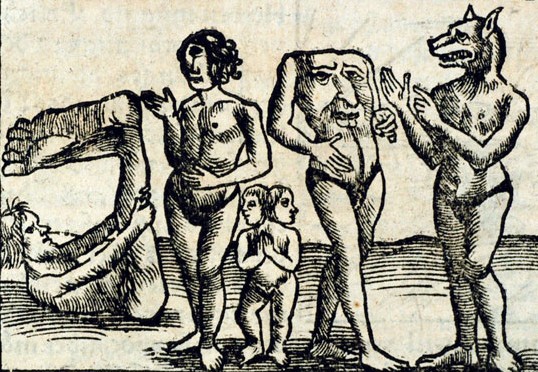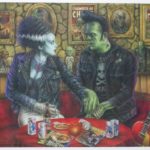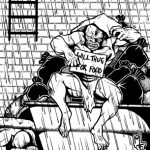The American Heritage College Dictionary defines the word freak as:
- A thing or occurrence that is markedly unusual or irregular.
- An abnormally formed organism, esp. a person or animal regarded as a curiosity or monstrosity.
- A sudden capricious turn of mind; a whim.
- Slang. a. A drug user or addict. b. An eccentric or nonconformist person, esp. a member of a counterculture. c. An
The freak (also known as prodigy, abnormal, deviant, human odditie, human marvel), as we will call it, is a very wide and undefined category that includes many different genres from the very human to the extreme monstrous. To make it simple, we will limit ourselves to the human oddities, who have either a mythological or mythical background or were displayed as human oddities in sideshows.

The human monster or ‘freak,’ a result of genetic deviance, has existed for as long as the species itself has. Ancient references to monstrosity occur in The Bible in 4 Ezra.5:
"There shall be a confusion also in many places, and the fire shall be oft sent out again, and the wild beasts shall change their places, and menstruous women shall bring forth monsters."
Montaigne, "Of a Monstrous Child" (ed Donald M. Frame, p. 539):
"And what are these things of mine, in truth, but grotesques and monstrous bodies, pieced together of divers members, without definite shape, having no order, sequence, or proportion other than accidental.’
"What we call monsters are not so to God, who sees in the immensity of his work the infinity of forms that he has comprised in it; and it is for us to believe that this figure that astonishes us is related and linked to some other figure of the same kind unknown to man."
The best definition comes from Leslie Fiedler but Montaigne words and call for universal understanding are still actual.
"The true freak, however, stirs both supernatural terror and natural sympathy, since unlike the fabulous monsters, he is one of us, the human child of human parents, however altered by forces we do not quite understand into something mythic and mysterious, as no mere cripple ever is. Passing either on the street, we may be simultaneously tempted to avert our eyes and to stare; but in the latter case we feel no threat to those desperately maintained boundaries on which any definition of sanity ultimately depends. On the true Freak challenges the conventional boundaries between male and female, sexed and sexless, animal and human, large and small, self and other, and consequently between reality and illusion, experience and fantasy, fact and myth."
Leslie Fiedler, Freaks: Myths and Images of the Secret Self (New York: Simon and Schuster, 1978), p.24.
Disability
The term "disability" has many definitions. The Americans with Disabilities Act of 1990 defines "disability" as:
- "a physical or mental impairment that substantially limits one or more major life activities;
- a record of such impairment; or
- being regarded as having such an impairment."
This is a significant difference from the definition of "disability" used in 1980 by the World Health Organization, which defines "disability" as "any restriction or lack (resulting from an impairment) of ability to perform an activity in the manner or within the range considered normal for a human being."
Since every human being, disabled or not, has different personalities and levels of ability, does "normal" even exist? Are all people with disabilities "abnormal"? Using the term "normal" creates a myth that such a group of people exists. This mythological normal person is of, average build, average education, and average ability. He or she is a conglomeration of all statistics, managing to meet the established median, deviating just enough not to be a clone of every other "normal" human being.
Disability can also be defined not as something inherent in a person, but something affecting a person with a disability living in an (assumed) able-bodied society. In the 1970s, "activists argued that the degree of a person’s ability or disability is determined by access to public facilities, social support, protection against discrimination, and cultural acceptance. Exclusionary conditions, not impairments, are the root cause of disability."








